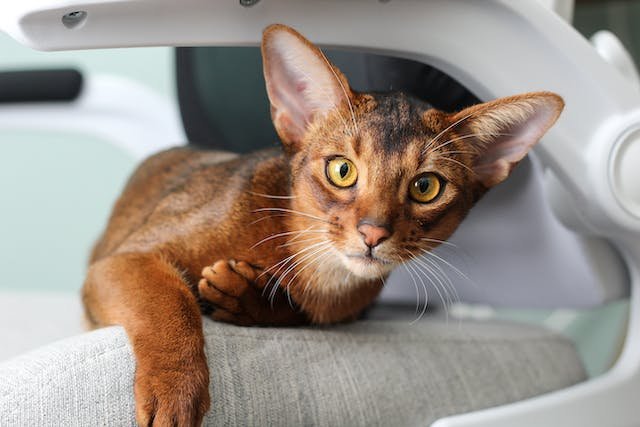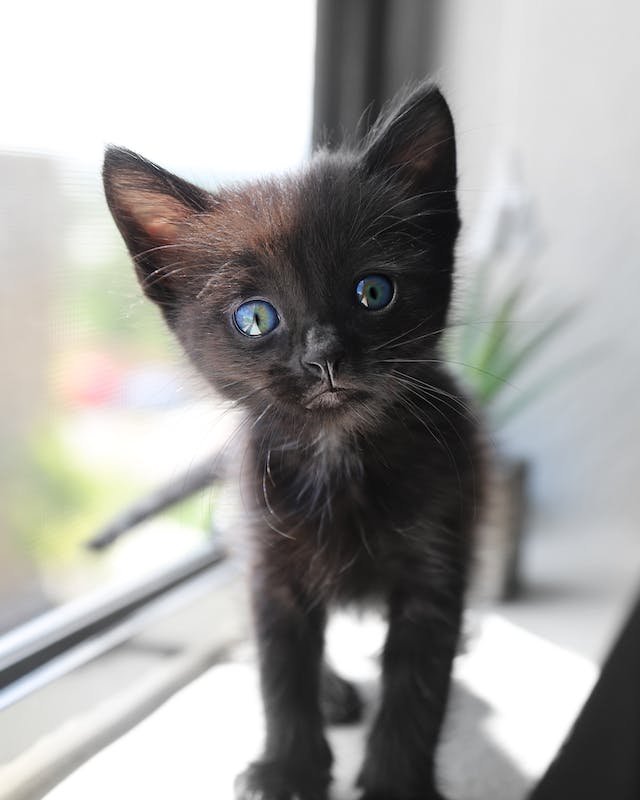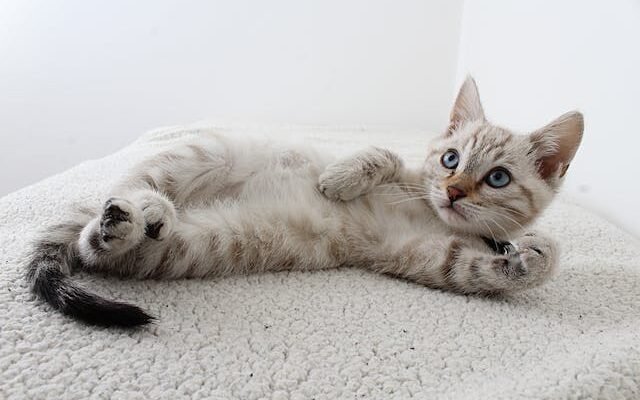Abyssinian breeders are known for their stunningly beautiful coats, distinctive ticked patterns, and lively personalities. For many cat lovers, these attributes make them the ideal feline companion. However, finding the perfect Abyssinian kitten is a journey that requires thoughtful consideration and careful navigation, starting with choosing a reputable breeder.
This comprehensive guide is tailored to cat enthusiasts who are considering bringing an Abyssinian into their lives. From understanding the breed’s origins to selecting the right kitten, we’ll delve into every aspect of the process so that you can make an informed decision and embark on a rewarding journey with your new furry friend.
Abyssinian Breeders: A Brief Overview
Resembling the paintings and sculptures of ancient Egypt, the Abyssinians have captivated people with their wild appearance and playful nature. Standing out for their almond-shaped eyes and a coat that seems to shimmer in earthy hues, they are often noted for their unique beauty.
Originating from the hilly areas of Southeast Asia, where they roamed like any naturalized cat, the breed has journeyed to become a cherished part of cat households worldwide. Known for their intelligence, curiosity, and loyalty, Abyssinians tend to form strong bonds with their human companions, making them one of the most popular breeds globally.
History of the Abyssinian Breed
The history of the Abyssinian breed is shrouded in legend and mystery, with some believing that the breed dates back to the time of the Pharaohs. However, the modern-day domestic Abyssinian cat we know has more recent roots. Tracing back to the late 19th century, the first recorded Abyssinian cat arrived in England from Abyssinia, now known as Ethiopia.
The breed gained popularity and was recognized by cat clubs in Britain, leading to selective breeding and the establishment of the breed’s standards. Over time, breeders around the world have refined Abyssinians into the sleek, agile, and intelligent cats they are today.

Characteristics and Physical Traits
The Abyssinian’s physical appearance is a key part of their allure. Their coat is perhaps their most striking feature, appearing to change color in different lights. It’s a testament to the ticked tabby pattern, where each hair has bands of color with darker tips.
Their angular features, large ears, and expressive eyes give them a regal and alert appearance. A well-developed musculature reinforces their appearance, reflecting their active natures. Beyond their looks, Abyssinians are incredibly agile, with a gait and movements that are both graceful and powerful.
Temperament and Personality
The Abyssinian has a reputation for being inquisitive, sociable, and high-spirited. These qualities make them active participants in your daily life, often following you from room to room to see what you’re up to. They relish attention and interaction, but they are also independent souls who appreciate their own space. Their high energy levels mean that they need stimulation, whether through interactive play or through feline company. Abyssinians are often described as ‘dog-like’ in their loyalty and intelligence, making them easily trainable and keen to learn new tricks.
Choosing a Reputable Abyssinian Breeder
When embarking on the journey to bring an Abyssinian into your home, the breeder you choose plays a crucial role in ensuring you get a healthy and well-socialized kitten. Here, we’ll explore the key factors in identifying a breeder who upholds the highest standards of care for their cats and is dedicated to the betterment of the breed. Understanding the red flags and asking the right questions will significantly influence your experience and the future well-being of your feline friend.
Factors to Consider When Selecting a Breeder
The journey to find a reputable breeder begins with research. Looking into the breeder’s history, the care and environment of their cattery, and the emphasis on genetic testing can provide critical insights into their practices. Learn about the breeder’s experience, the lineage of their cats, and the involvement in the cat community. Attend cat shows or breeder open houses to meet them and their cats in person.
The Interview Process: What to Ask and What to Look For
An in-depth interview with a breeder should cover a wide range of topics, including the health guarantees of the kittens, socialization strategies, and post-adoption support. Observe the cat’s living conditions, ensuring they are kept in clean and spacious environments with access to toys and social interaction. Look for breeders who are transparent and welcoming of your questions.
Red Flags That Signal You Should Look Elsewhere
Certain indicators should raise concern and prompt you to consider other options. Breeders who are evasive about the health of their cats, the living conditions of their cattery, or proof of genetic testing should be avoided. Additionally, if a breeder seems disinterested in matching you with the right kitten, it could be a sign that they care more about transactions than the well-being of their cats.
Preparing for an Abyssinian Kitten
Bringing an Abyssinian kitten into your home is a joyous occasion, but it requires preparation to ensure a smooth transition. In this section, we’ll discuss the steps you need to take to make your home a welcoming and secure environment for your new family member.
Kitten-Proofing Your Home
Just as you would prepare for a human toddler, you need to kitten-proof your home. Remove any hazardous items, secure dangling cords, and block off areas where your kitten could get stuck or hurt. Invest in scratching posts, climbing trees, and toys to satisfy their natural behaviors and keep them entertained.
The Essentials: Tools and Supplies You Will Need
Stock up on the essentials before your kitten’s arrival. Abyssinians are particularly fond of interactive toys that challenge their minds and encourage physical activity. You’ll also need to provide them with a litter box, high-quality kitten food, and a cozy bed. Ensure you have the right grooming tools to look after their short, easy-care coat.
Setting Up Their Personal Space: The Importance of Sanctuary
Cats thrive on routine and familiarity. Set up a designated area for your kitten with their bed, litter box, and a few toys. This will give them a sense of security and a place to retreat to when they need a break. As your kitten feels more at home, you can gradually introduce them to the rest of your living space.
Caring for Your Abyssinian
The care you provide for your Abyssinian is pivotal for their physical and emotional health. Here, we’ll dive into the specifics of their dietary needs, grooming requirements, and how to keep them active and content.
Diet and Nutrition
High-quality cat food formulated specifically for kittens is essential to support their growth and development. Abyssinians enjoy mealtime, so it’s an excellent opportunity for bonding. Provide them with a balanced diet of wet and dry food, and monitor their weight to prevent obesity.
Grooming Your Abyssinian
Abyssinians have a short, dense coat that doesn’t require much grooming. However, regular brushing helps to minimize shedding and keeps their coat looking its best. Get your kitten accustomed to grooming early so that it becomes an enjoyable bonding activity for both of you.

Exercise and Playtime: Essential for a Happy, Healthy Kitty
Abyssinians are one of the most active and playful cat breeds. Regular play sessions are essential to keep them mentally and physically stimulated. They enjoy interactive toys, puzzle feeders, and games that challenge their agility and intelligence.
Health and Common Issues
Like all breeds, Abyssinians are prone to certain health issues. Being aware of these conditions and seeking routine veterinary care is crucial in maintaining your cat’s health.
Genetic Health Considerations
Responsible breeders choose their breeding cats carefully, selecting for health and longevity in addition to the breed standard. This approach is vital in reducing the prevalence of hereditary conditions within the breed. Discuss with your breeder any health issues in the lineage and the steps they have taken to breed healthy kittens.
Preventive Care
Adhere to your veterinarian’s recommendations for vaccinations and preventive care. Early and consistent vaccinations protect your kitten from common communicable diseases. Maintain a regular schedule of check-ups to monitor their growth and address any health concerns promptly.
Training and Socialization
Abyssinians are intelligent and can be trained to some degree. Positive reinforcement and interactive play can help shape their behavior and strengthen the bond between you and your cat.
Basic Training Techniques
Start with simple commands such as ‘sit’ and ‘come.’ Use treats and playful interactions to reinforce these behaviors. Consistency and patience are key, as your Abyssinian will respond to your positive interactions and the stimulation of learning.
Socializing with Other Pets and People
Early socialization is crucial for any kitten. Introduce your Abyssinian to a variety of people and animals in a controlled environment to promote confidence and ease around strangers. Encourage positive interactions and provide a safe, familiar setting for them to return to if they feel overwhelmed.
Fostering a Positive Relationship with Your Breeder: A Lifelong Support System
Your relationship with your breeder should ideally continue after you bring your kitten home. A good breeder is a valuable resource for advice, support, and a shared love of the breed you both care deeply about.
The Role of the Breeder Beyond the Sale
Reputable breeders are invested in the well-being of their kittens for life. They should be available to answer questions, provide guidance, and, if necessary, help with rehoming. Stay in touch with your breeder, share updates on your kitten’s well-being, and participate in the breeder’s community if they have one.
Conclusion
Owning an Abyssinian is a unique and rewarding experience. It’s a partnership with a spirited, intelligent, and affectionate companion that challenges and enriches your life in countless ways. Through careful selection of a reputable breeder, diligent care, and nurturing, you’ll be well on your way to enjoying the joys of owning an Abyssinian.
Adopting from an ethical breeder who prioritizes the health and happiness of their cats ensures that you’ll have a loving and healthy pet that embodies the best of the Abyssinian breed. A trustworthy breeder not only provides you with a kitten but also with support, knowledge, and a connection to a community of fellow cat lovers.
FAQs
How Can I Tell If a Breeder Is Reputable?
Look for breeders who are knowledgeable about the breed, dedicated to the health and well-being of their cats, and are forthcoming with information about their breeding practices. They should be registered with a cat association and willing to provide you with references from other happy kitten owners.
Should I Visit Multiple Breeders Before Deciding?
Yes, visiting multiple breeders gives you a broader perspective on the breed and helps you compare practices and kitten environments. It also allows you to get a ‘feel’ for the breeder and their relationship with their cats.
What Should I Do if a Breeder Doesn’t Want Me to Visit Their Cattery?
This is a significant red flag. A breeder who is confident in the quality of their facilities and their cats will be more than willing to show you around. If a breeder is resistant to this, it’s best to move on and find one who is more transparent.
Can Abyssinian kittens be trained as indoor cats?
Yes, you can train an Abyssinian to be an indoor cat. Providing them with plenty of toys, scratching posts, and perches can help replicate the outdoor experience. Regular interaction and play with you will also help satisfy their active nature.
What Support Can I Expect from a Good Breeder?
A good breeder offers ongoing support, advice, and a network within the cat community. They will be available to answer your questions and provide guidance throughout your cat’s life. Some may offer health guarantees and a few even request that, in the event you can no longer care for your Abyssinian, the cat be returned to them for rehoming.
What Is the Average Lifespan of an Abyssinian Cat?
The lifespan of an Abyssinian cat is usually between 9 and 15 years, although many live into their late teens and early twenties. By ensuring you choose a responsible breeder who considers health when breeding, and provides a nutritious diet, plenty of exercise, and routine veterinary care, you help stack the odds in favor of your Abyssinian leading a long, healthy life.
By following this guide, you’re taking the first steps toward fostering a strong, healthy, and joyous relationship with your Abyssinian cat. Remember, the journey doesn’t end when you bring your kitten home—it’s just the beginning of a lifetime of adventures, companionship, and love.




